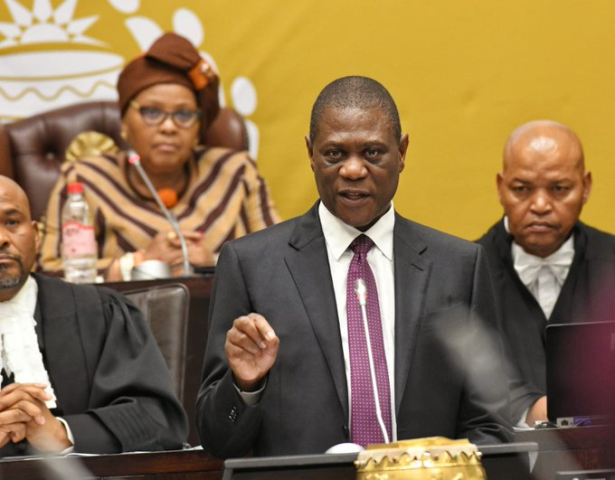Mashatile Calls for Urgent Reforms to Strengthen State Capability and Ethics
Deputy President Mashatile reiterated that creating a capable and developmental state is central to South Africa’s seventh administration and the goals of the Government of National Unity (GNU).

- Country:
- South Africa
In a major call to action for governance reform, Deputy President Paul Mashatile has emphasized the urgent need to rebuild the South African state into a capable, ethical, and development-oriented institution. Speaking during a high-level roundtable discussion at the Sefako Makgatho Presidential Guest House in Pretoria, the Deputy President laid bare the systemic weaknesses plaguing South Africa’s governance framework and outlined a reform agenda rooted in professionalisation, institutional accountability, and leadership stability.
The engagement forms part of the Presidency’s efforts to accelerate the implementation of the National Development Plan (NDP) 2030, with particular focus on improving the interface between political leadership and public administration — a relationship Mashatile described as “essential but often strained.”
HSRC Evaluation Highlights Deep Structural Issues
Central to the roundtable’s agenda was a synthesis evaluation report presented by the Human Sciences Research Council (HSRC), which paints a troubling picture of institutional fragility, high leadership turnover, and political interference. Key findings from the evaluation include:
-
Frequent changes in Directors-General (DGs) disrupting continuity and weakening departmental capacity.
-
Persistent political meddling in administrative affairs, undermining merit-based decision-making.
-
Deficient performance management systems that fail to hold leaders accountable or track outcomes effectively.
These issues are contributing to a deterioration of institutional memory, breakdown in policy continuity, and growing public frustration over inadequate service delivery.
A Capable State: More Than Just a Buzzword
Deputy President Mashatile reiterated that creating a capable and developmental state is central to South Africa’s seventh administration and the goals of the Government of National Unity (GNU). He defined such a state as one that possesses the skills, systems, and structures to implement policies that foster inclusive growth, reduce poverty, and improve citizen well-being.
“Our state machinery must be agile, ethical, and efficient—built on the foundations of clear institutional design and free from undue political interference,” Mashatile asserted. “Without reforming the political-administrative interface, all other developmental goals will remain out of reach.”
He emphasized that the task at hand is urgent: to restore citizen trust, drive economic recovery, and create a public sector that supports innovation, entrepreneurship, and job creation — particularly among the youth.
Public Service Professionalisation Framework Launched
In response to the HSRC’s findings and the ongoing governance challenges, the Deputy President announced that the government is actively implementing the National Framework for Public Service Professionalisation. This policy framework aims to:
-
Establish a merit-based appointment process at all levels of government.
-
Stabilize leadership positions, particularly among DGs and Heads of Department.
-
Strengthen the performance and accountability systems across departments.
-
Promote a culture of ethical leadership, competence, and fairness.
The framework also seeks to curb political encroachment into administrative domains by reinforcing separation of roles and ensuring consistent application of rules.
Buthelezi Reinforces Call for Ethical Governance
Minister for Public Service and Administration Mzamo Buthelezi, who also addressed the roundtable, echoed the Deputy President’s sentiments, stating:
“The relationship between political heads and accounting officers forms a crucial pillar of our institutional capacity. If that pillar is unstable, governance itself becomes compromised.”
Buthelezi reiterated the need for a transparent and ethical state that serves citizens with integrity, highlighting that political interference, misaligned mandates, and poor interdepartmental coordination are barriers to development.
War Rooms for Targeted Action
Mashatile proposed the creation of issue-specific “war rooms” focusing on three critical areas:
-
Economic Growth and Investment
-
Poverty Reduction and Inequality
-
Clean and Accountable Governance
These specialized task teams would monitor delivery cycles, ensure improved procurement processes, and prioritize timely payments to SMMEs, which are essential drivers of economic inclusion.
He stressed that these war rooms must operate with evidence-based strategies, draw on private sector expertise, and maintain a focus on results, not rhetoric.
A New Social Compact for Governance
The Deputy President’s speech concluded with a call for a new social compact—a renewed commitment among political leaders, public servants, civil society, and communities to build a state that works for all South Africans.
“We must recognise that reforming the political-administrative interface is not an afterthought—it is a precondition for building the capable, developmental, and ethical state our Constitution envisions.”
In addressing the lingering effects of apartheid, corruption, skills shortages, and fragmented accountability, Mashatile and his administration are positioning the public service as a catalyst for economic transformation and social justice.
The roundtable marks a critical turning point in the journey toward better governance and reaffirms the administration’s resolve to ensure that state institutions are not only functional but future-ready.









